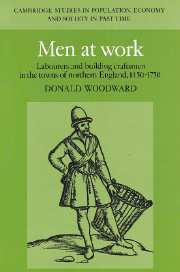Book contents
- Frontmatter
- Contents
- List of tables
- List of appendices
- Preface
- List of abbreviation
- 1 Introduction
- 2 Building craftsmen at work
- 3 The life-cycle of building craftsmen
- 4 Labourers
- 5 Conditions of work for labourers and building craftsmen
- 6 Wage rates in the northern towns
- 7 Towards an understanding of living standards
- Appendices
- Bibliography
- Index
- Cambridge Studies in Population, Economy and Society in Past Time
1 - Introduction
Published online by Cambridge University Press: 15 October 2009
- Frontmatter
- Contents
- List of tables
- List of appendices
- Preface
- List of abbreviation
- 1 Introduction
- 2 Building craftsmen at work
- 3 The life-cycle of building craftsmen
- 4 Labourers
- 5 Conditions of work for labourers and building craftsmen
- 6 Wage rates in the northern towns
- 7 Towards an understanding of living standards
- Appendices
- Bibliography
- Index
- Cambridge Studies in Population, Economy and Society in Past Time
Summary
Two essentially different types of workmen are considered in this book, labourers and building craftsmen. Although they could often be found working side by side, their position in the labour market and the niches they occupied in urban society were markedly different. Labourers were often called in to assist their more skilled neighbours, but they frequently worked in gangs, large and small, on tasks which did not involve craftsmen: they cleansed the highways, emptied latrine barrels, scoured ditches, removed dead horses from fresh water-channels, and accomplished a thousand and one tasks which did not require specialist skills. They, and their rural counterparts, were the true wage-earners of late-medieval and early-modern England, selling their labour for cash, although it is not to be imagined that, even in the towns, they derived the whole of their incomes from wage-earning. Labourers were usually hired by the day, and provided by their employers with the tools and raw materials with which they worked.
Building craftsmen were a different breed. Strictly speaking many of them were not wage-earners in the modern sense of the term. Master craftsmen were ‘small masters’ or petty entrepreneurs, possessing their own tools and often supplying the raw materials for the task in hand.
- Type
- Chapter
- Information
- Men at WorkLabourers and Building Craftsmen in the Towns of Northern England, 1450–1750, pp. 1 - 14Publisher: Cambridge University PressPrint publication year: 1995

